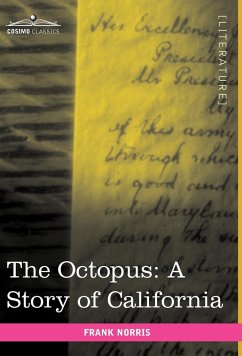Like his more famous contemporary Upton Sinclair, American author BENJAMIN FRANKLIN NORRIS, JR. (1870-1902) also highlighted the corruption and greed of corporate monopolies in the late 19th and early 20th centuries... themes that continue to make his work riveting reading more than a century later. The Octopus, first published in 1901, is the tale of a war between wheat growers in California and the Railroad Trust. Rancher Magnus Derrick and railroad representative S. Behrman square off-to disastrous results-as poet Presley, a stand-in for Norris, observes and chronicles the tragedy. The first part of Norris's projected "Trilogy of the Epic of the Wheat," The Octopus is followed by 1903's The Pit, also available from Cosimo. (Norris died before he could write the third volume, The Wolf.)







